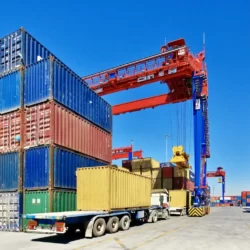Orchestrating transportation with data

Logistics in modern companies not only supports corporate strategy, it enables it. And to meet today’s logistics challenges of the three C’s – customer service, carbon, and cost, these companies are looking to harness data. Let us face it; logistics is always a challenging endeavor, even beyond the latest pandemic disruption. Companies realize the need for agility to pivot their logistics operations quickly, allowing them to meet new market conditions. Data is the enabler that allows companies to meet these changing market dynamics through optimal transportation orchestration.
By Dominic Regan
To that end, we have recently published How to Regain Control of your Logistics Data with Transportation Orchestration, a guide that shows you how to optimize your logistics outsourcing model utilizing data. According to 2021 Third-Party Logistics Study: State of Logistics Outsourcing Report, 82% of the shipper respondents viewed data and analytics as a critical factor in successful 3PL customer relationships. The same number (82%) view technology and digital solutions as another critical factor.
Examples of leveraging data to enable modern transportation orchestration
Do you need rapid and accurate evaluation of transportation options? Logistics data allows companies to perform what-if scenario modeling to improve transportation planning efficiency and validate outsourced carrier operations without disrupting daily operational transport planning – resulting in streamlined operations and better productivity.
How about your need for a seamless corporate transportation analysis? A single logistics data repository can provide accurate analysis and validation of corporate transportation spend — regardless of whether transportation is insourced, outsourced, or via a blended approach — as a step toward advanced transportation management. A central data repository gives users a single, real-time, consolidated view of their transportation costs.
Finally, do you have costly errors in transportation invoicing? Access to logistics data can help validate the accuracy of freight invoices by performing a 100% match against the transportation services delivered; regardless of whether planning is undertaken in-house or by logistics providers. Logistics data validation results in fewer manual errors and greater cost accuracy.
Companies that implement integrated solutions comprising improvements to technology, data modeling and transportation management processes have seen significant enhancements in orchestrating their logistics operations. These improvements raise the bar as a key differentiator for companies that are competing for the same customers, transportation capacity or both.
Oracle can help you better leverage logistics data to make better business decisions, support and enable corporate strategy, and gain total cost control.
Webinar Wednesday January 19
Supply Chain Media and Oracle are organizing the webinar End-to-end Transport Management, on Wednesday 19th January 2022 starting at 16:00 hrs CET. Learn from guestspeaker RHI Magnesita why end-to-end transport visibility is not just a nice to have, but a means to have more cost control, and an enabler for better decisions on risk management and performance improvement.









